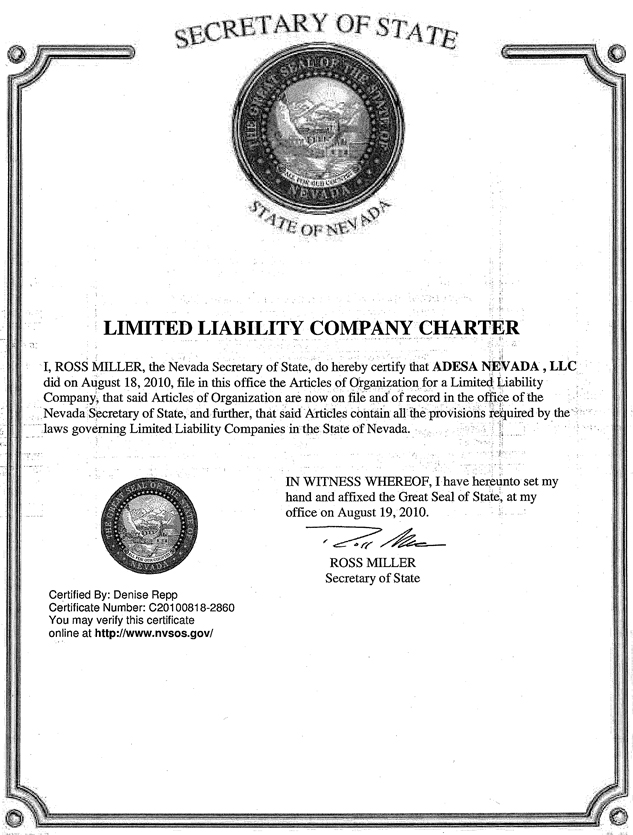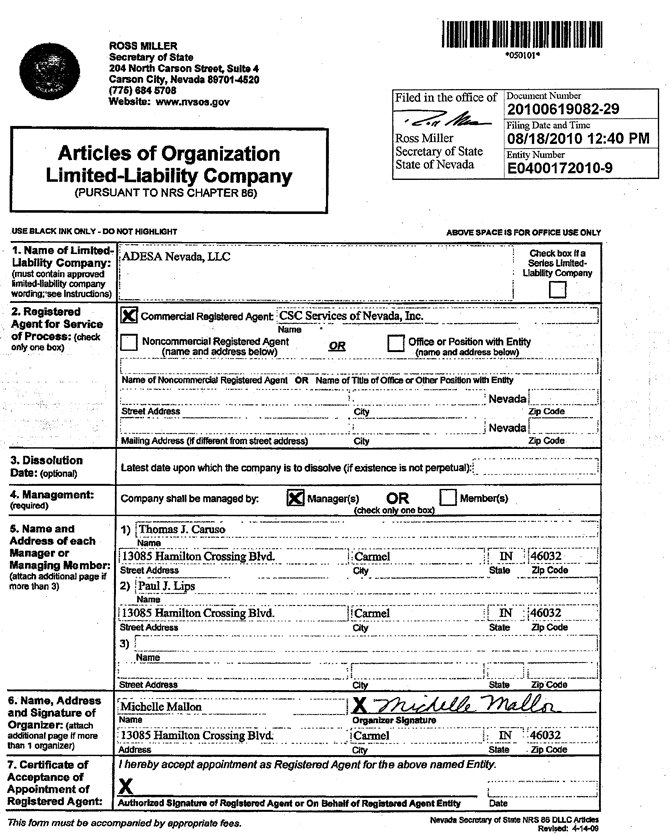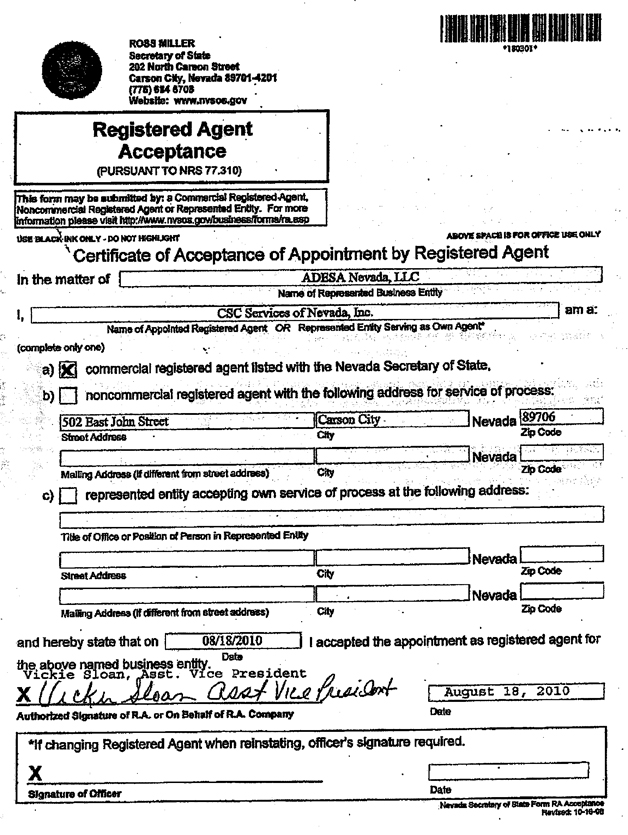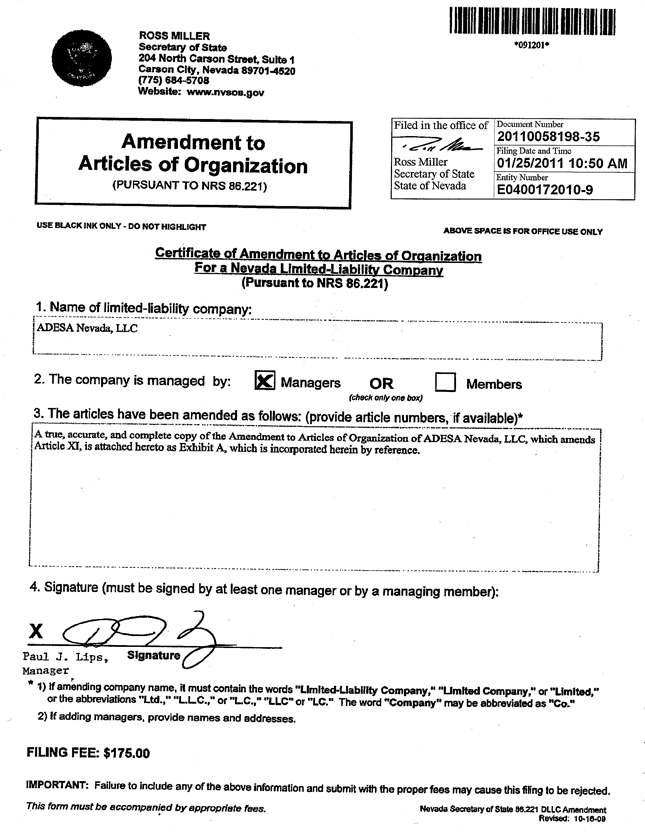Exhibit 3.119


ATTACHMENT TO
ARTICLES OF ORGANIZATION
OF
ADESA NEVADA, LLC
The following provisions are hereby incorporated in Nevada Secretary of State NRS 86 DLLC Articles form for ADESA Nevada, LLC (the “Company”):
ARTICLE VIII.
Purpose
The purpose of the Company shall be to conduct any and all lawful business and activities for which limited liability companies may be organized under the Act.
ARTICLE IX.
Transferability
A Member of the Company may transfer his, her or its interest in the Company in accordance with the provisions of the Company’s Operating Agreement and the Act.
ARTICLE X.
Initial Member
The sole initial Member of the Company is ADESA, Inc.
ARTICLE XI.
Indemnification
(a) To the greatest extent not inconsistent with the laws and public policies of Indiana the Company shall indemnity any Member or Organizer (any such Member or Organizer and any responsible officers, partners, shareholders, members, directors, or managers of such Member or Organizer which is an entity, hereinafter being referred to as the indemnified “person”) made a party to any proceeding because such person is or was a Member or Organizer (or a responsible officer, partner, shareholder, member, director, or manager thereof), as a matter of right, against all liability incurred by such person in connection with any proceeding; provided that it shall be determined in the specific case in accordance with paragraph (d) of this Article that indemnification of such person is permissible in the circumstances because the person has met the standard of conduct for indemnification set forth in paragraph (c) of this Article. The Company shall pay for or reimburse the reasonable expenses incurred by such a person in connection with any such proceeding in advance of final disposition thereof if (i) the person furnishes the Company a written affirmation of the person’s good faith belief that he, she or it has met the standard of conduct for indemnification described in paragraph (c) of this Article, (ii) the person furnishes the Company a written undertaking, executed personally or on such person’s behalf, to repay the advance if it is ultimately determined that such person did not meet such standard of conduct, and (iii) a determination is made in accordance with paragraph (d) that based upon facts then known to those making the determination, indemnification would not be precluded under this Article. The undertaking described in subparagraph (a)(ii) above must be a general obligation of the person subject to such reasonable limitations as the Company may permit, but need not be secured and may be accepted without reference to financial ability to make repayment. The Company shall indemnify a person who is wholly successful, on the merits or otherwise, in the defense of any such proceeding, as a matter of right, against reasonable expenses incurred by the person in connection with the proceeding without the requirement of a determination as set form in paragraph (c) of this Article. Upon demand by a person for indemnification
or advancement of expenses, as the case may be, the Company shall expeditiously determine whether the person is entitled thereto in accordance with this Article. The indemnification and advancement of expenses provided for under this Article shall be applicable to any proceeding arising from acts or omissions occurring before or after the adoption of this Article.
(b) The Company shall have the power, but not the obligation, to indemnify any person who is or was an employee or agent of the Company to the same extent as if such person was an indemnified person as defined in paragraph (a) of this Article.
(c) Indemnification of a person is permissible under this Article only if (i) such person conducted himself, herself or itself in good faith, (ii) such person reasonably believed that his, her or its conduct was in or at least not opposed to the Company’s best interest, and (iii) in the case of any criminal proceeding, such person had no reasonable cause to believe his, her or its conduct was unlawful. Indemnification is not permissible against liability to the extent such liability is the result of the person’s willful misconduct, recklessness, violation of the Company’s Operating Agreement or any improperly obtained financial or other benefit to which the person was not legally entitled. The termination of a proceeding by judgment, order, settlement, conviction or upon a plea of nolo contendere or its equivalent is not, of itself, determinative that the person did not meet the standard of conduct described in this paragraph (c).
(d) A determination as to whether indemnification or advancement of expenses is permissible shall be made by (i) a majority in interest of the Members (including any interested Member); or (ii) independent special legal counsel selected in accordance with (d)(i) above.
(e) Any person (as defined in paragraph (a) of this Article) who is a party to a proceeding may apply for indemnification from the Company to the court, if any, conducting the proceeding or to another court of competent jurisdiction. On receipt of an application, the court, after giving notice the court considers necessary, may order indemnification if it determines:
| (i) | In a proceeding in which the person is wholly successful, on the merits or otherwise, the person is entitled to indemnification under this Article, in which case the court shall order the Company to pay the person his, her or its reasonable expenses incurred to obtain such court ordered indemnification; or |
| (ii) | The person is fairly and reasonably entitled to indemnification in view of all the relevant circumstances, whether or not the person met the standard of conduct set forth in paragraph (c) of this Article. |
(f) Indemnification shall also be provided for a person’s conduct with respect to an employee benefit plan if the person reasonably believed his, her or its conduct to be in the interests of the participants in and beneficiaries of the plan.
(g) Nothing contained in this Article shall limit or preclude the exercise or be deemed exclusive of any right under the law, by contract or otherwise, relating to indemnification of or advancement of expenses to any such person or any person who is or was serving at the Company’s request as a director, officer, partner, member, manager, trustee, employee, or agent of another foreign or domestic company, partnership, association, limited liability company, corporation, joint venture, trust, employee benefit plan, or other enterprise, whether for-profit or not. Nothing contained in this Article shall limit the ability of the Company to otherwise indemnify or advance expenses to any person. It is the intent of this Article to provide indemnification to such a person to the fullest extent now or hereafter permitted by the law consistent with the terms and conditions of this Article. If indemnification is permitted under this Article indemnification shall be provided in accordance with this Article irrespective of the nature of the legal or
- 4 -
equitable theory upon which a claim is asserted, including without limitation, negligence, breach of duty, waste, breach of contract (except to the extent the claim relates to the Operating Agreement or a contract between the Company and that Member), breach of warranty, strict liability, violation of federal or state securities law, violation of the Employee Retirement Income Security Act of 1974, as amended, or violation of any other state or federal law.
(h) For purposes of this Article:
| (i) | The term “expenses” includes all direct and indirect costs (including without limitation counsel fees, retainers, court costs, transcripts, fees of experts, witness fees, travel expenses, duplicating costs, printing and binding costs, telephone charges, postage, delivery service fees and all other disbursements or out-of-pocket expenses) actually incurred in connection with the investigation, defense, settlement or appeal of a proceeding or establishing or enforcing a right to indemnification under this Article, applicable law or otherwise. |
| (ii) | The term “liability” means the obligation to pay a judgment, settlement, penalty, fine, excise tax (including an excise tax assessed with respect to an employee benefit plan), or reasonable expenses incurred with respect to a proceeding. |
| (iii) | The term “party” includes a person who was, is or is threatened to be made a named defendant or respondent in a proceeding. |
| (iv) | The term “proceeding” means any threatened, pending or completed action, suit or proceeding, whether civil, criminal, administrative or investigative and whether formal or informal. |
(i) The Company may purchase and maintain insurance for its benefit, the benefit of any person who is entitled to indemnification under this Article, or both, against any liability asserted against or incurred by such person in any capacity or arising out of such person’s service with the Company, whether or not the Company would have the power to indemnify such person against such liability.
- 5 -


Exhibit A
Amendment to Articles of Organization
(PURSUANT TO NRS 86.221)
ARTICLE XI.
Indemnification
(a) To the greatest extent not inconsistent with the laws and public policies of the state of Nevada the Company shall indemnity any Member or Organizer (any such Member or Organizer and any responsible officers, partners, shareholders, members, directors, or managers of such Member or Organizer which is an entity, hereinafter being referred to as the indemnified “person”) made a party to any proceeding because such person is or was a Member or Organizer (or a responsible officer, partner, shareholder, member, director, or manager thereof), as a matter of right, against all liability incurred by such person in connection with any proceeding; provided that it shall be determined in the specific case in accordance with paragraph (d) of this Article that indemnification of such person is permissible in the circumstances because the person has met the standard of conduct for indemnification set forth in paragraph (c) of this Article. The Company shall pay for or reimburse the reasonable expenses incurred by such a person in connection with any such proceeding in advance of final disposition thereof if (i) the person furnishes the Company a written affirmation of the person’s good faith belief that he, she or it has met the standard of conduct for indemnification described in paragraph (c) of this Article, (ii) the person furnishes the Company a written undertaking, executed personally or on such person’s behalf, to repay the advance if it is ultimately determined that such person did not meet such standard of conduct, and (iii) a determination is made in accordance with paragraph (d) that based upon facts then known to those making the determination, indemnification would not be precluded under this Article. The undertaking described in subparagraph (a)(ii) above must be a general obligation of the person subject to such reasonable limitations as the Company may permit, but need not be secured and may be accepted without reference to financial ability to make repayment. The Company shall indemnify a person who is wholly successful, on the merits or otherwise, in the defense of any such proceeding, as a matter of right, against reasonable expenses incurred by the person in connection with the proceeding without the requirement of a determination as set forth in paragraph (c) of this Article. Upon demand by a person for indemnification or advancement of expenses, as the case may be, the Company shall expeditiously determine whether the person is entitled thereto in accordance with this Article. The indemnification and advancement of expenses provided for under this Article shall be applicable to any proceeding arising from acts or omissions occurring before or after the adoption of this Article.